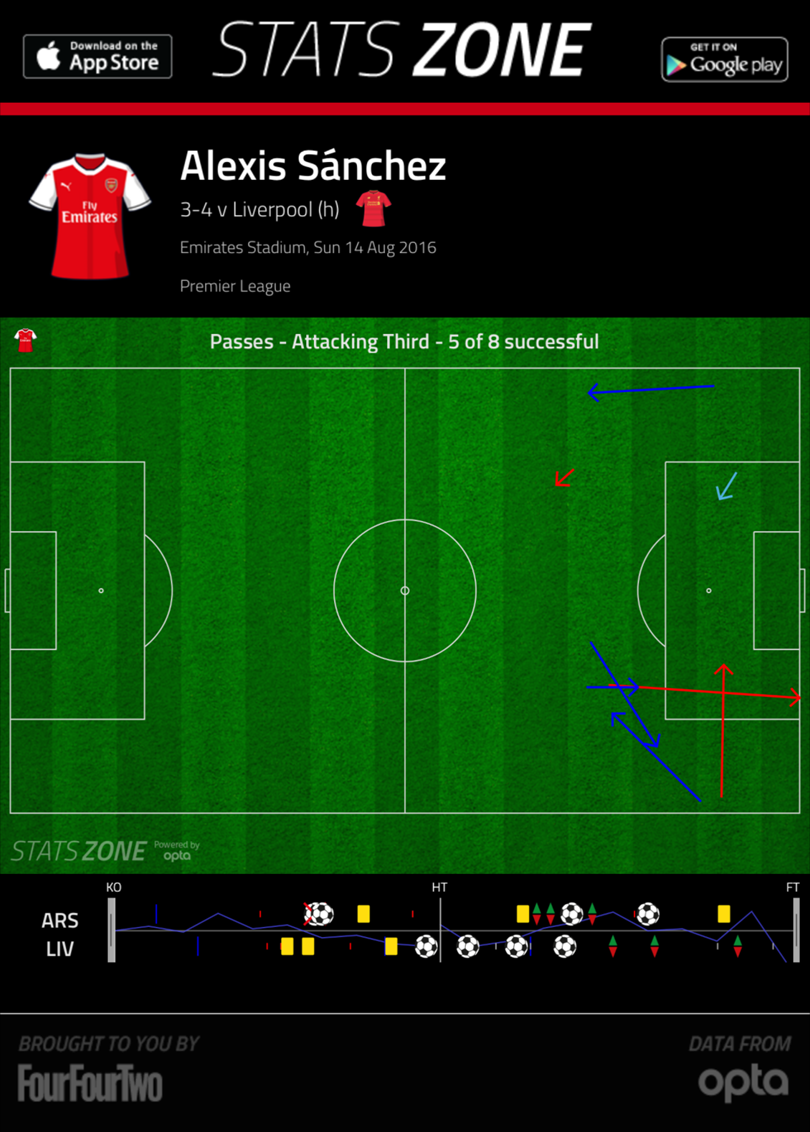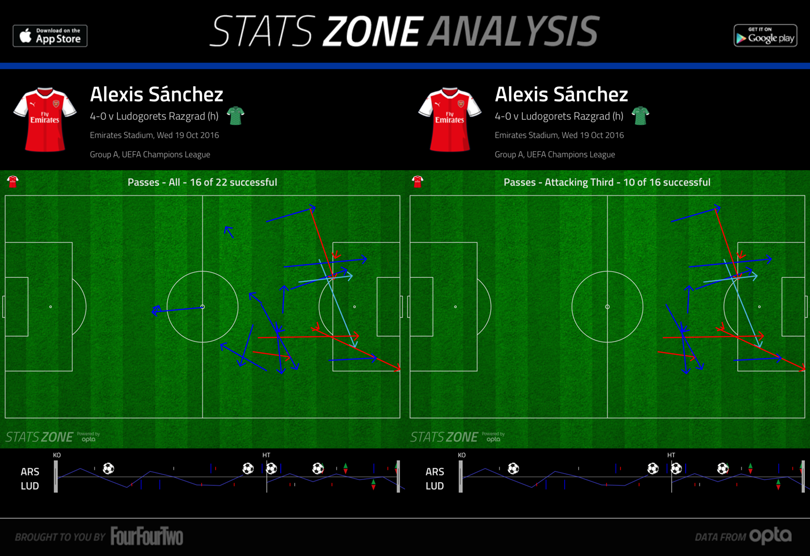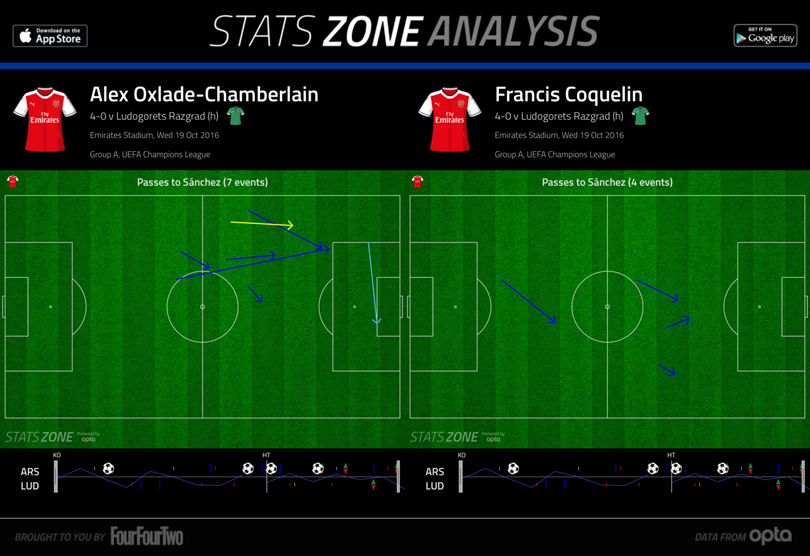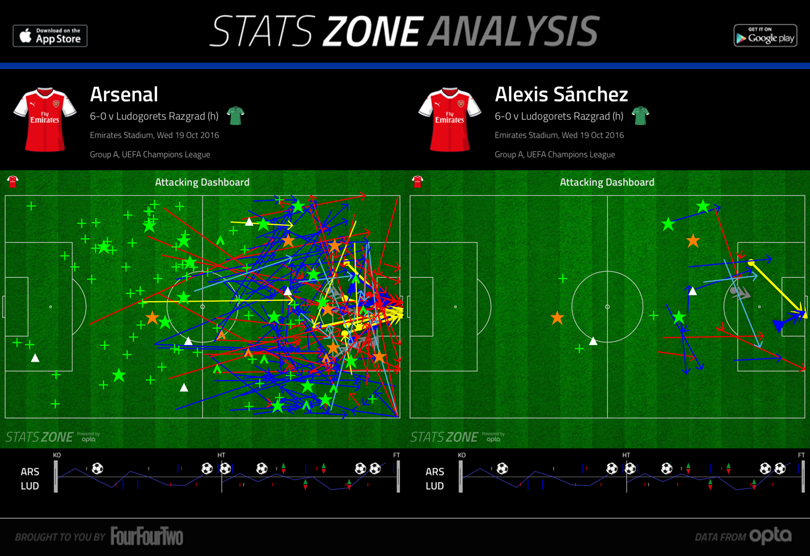How Alexis's redeployment has given Arsenal's attack a new dimension
The Chilean again excelled as a central striker against Ludogorets on Wednesday, prompting Seb Stafford-Bloor to explore why he's been such a success as the Gunners' furthest man forward

What a repurposing this has been. Another summer came and went at Arsenal and, with respect to Lucas Perez, another campaign began without the arrival of the elite forward the fans have long been hankering for. Big-name targets had been mentioned, their private jets seemingly circling Heathrow for weeks at a time, but Arsene Wenger – depending on who you believe – was unable to land any of them.
And, on the evidence of the season so far, that's just as well. Alexis Sanchez has filled the perceived gap and become Wenger's first-choice forward, leading the line against Ludogorets on Wednesday night for the 10th time this term.
It hasn't been a seamless transition and Sanchez hasn't switched positions without experiencing some turbulence. On the Premier League's opening day, within a rotten overall team performance, the Chilean was peripheral against Liverpool. Arsenal defended poorly, played into Jurgen Klopp's hands and suffered the consequences.
Sanchez was little more than a well-vantaged spectator that afternoon. He completed just 12 of 16 passes, an anaemic five of eight in the attacking-third, and fed just a single ball into the visitors' box; this, seemingly, was Wenger's failed attempt to disguise his spendthrift tendencies.

Rounded threat
More pertinently, of course, he's put together a highlight reel of game-defining moments which have characterised the subsequent speed of his adaptation
But fast-forward to the most recent round of Premier League fixtures and Sanchez's average passes per game had soared to a busy 40.9. More pertinently, of course, he's put together a highlight reel of game-defining moments which have characterised the subsequent speed of his adaptation.
Neatly, such clips also show the balance of his contribution from this new central striker role: the weighted chip at Watford for Mesut Ozil's planted header, the lofted cross against Swansea for the German to score again and, in between, important goals at Watford, Chelsea and a double at Hull.
Get FourFourTwo Newsletter
The best features, fun and footballing quizzes, straight to your inbox every week.
His performance against Ludogorets on Wednesday evening was his season in a microcosm: splitting time between the visiting centre-backs and in a more withdrawn role, he created an excellent early chance for Theo Walcott before delightfully sandwedging Arsenal into the lead. It helped set the tone of a game which, as the evening progressed, became increasingly one-sided.

Silky skill set
Instead of ability - his low centre of gravity, mesmerising ball control, and goal threat – it's his feel for the new position which makes him so productive within it
In recent years, other sides have periodically tried to repackage attacking midfielders in a similar way, either out of necessity or tactical curiousity. More often than not, the results have been unconvincing. Old habits die hard and the player in question typically only succeeds in giving a vague impression of a proper forward, while also failing to replicate the production of his more familiar role. It's a battle between instinct and following instruction and, generally, the result is an ineffectual muddle.
That's why Sanchez is to be admired. The breadth of his skill set implies that he should be able to play as a forward, but others have shown that to be a false assumption. Instead of ability – his low centre of gravity, mesmerising ball control and goal threat – it's his feel for the new position which makes him so productive within it.
Interesting, also, is his ability to retain possession in congested situations despite the physical disadvantage he's often at. He's no targetman, for certain, but neither is he a channel-dweller nor the type of converted forward whose only influence is derived from pace or trickery. His default position is in the middle of the attacking third and, against Ludogorets, he was that reliable central outlet.

Theo's gain
In the first half especially, Theo Walcott was able to exploit space behind the back four and, though the England international had an excellent game in his own right, that was partly attributable to Sanchez's movement
As is entirely reasonable to expect, Sanchez is unorthodox. He takes more touches in possession than a traditional No.9 would and, consequently, the visiting defenders on Wednesday night struggled to either exert enough pressure on him to take away his time, or give themselves enough positional leeway to protect themselves. The Bulgarians faced a Sophie's Choice: either get too tight and allow him to float into the night, or stand off too much and allow him to push passes beyond them and into space. In the end they did both.
He wasn't the game's outstanding player and, in truth, his performance was blighted with tinges of self-indulgence, but the danger he carried was constant; there was a permanence to his threat. The value of that wasn't necessarily seen in his own individual performance, strong though it was, but rather in what he allowed others to do.
Sanchez naturally attracted a lot of attention, but in a panicked, line-contorting way. In the first half especially, Walcott was able to exploit space behind the back four and, though the England international had an excellent game in his own right, that was partly attributable to Sanchez's movement. The Chilean was neither consistently high nor deep and, inevitably, that created all manner of holes and angles for Arsenal's deeper playmakers (sometimes Sanchez himself) to penetrate.

Defender's nightmare

Kieran Tierney: Why Celtic's fearless young full-back is a wanted lad Europe-wide
Wiki Geeks: Meet the men keeping football's Wikipedia pages up to date
Remembering ClubCall: The pre-internet hotspot for transfers, rumours and rants
There lies the advantage which Wenger has been able to create: a more static forward – Olivier Giroud, for example – may present a different threat, but ultimately it's a more predictable one. By contrast, though Sanchez's size limits Arsenal's more direct routes up the pitch, the diversity of his play creates more fractures and has more of an overall weakening effect.
The caveat here is that Ludogorets are an underwhelming side and the 6-0 defeat they suffered emphasised their inferiority. However, the struggle they faced at the Emirates should challenge many other teams in much the same way this season: it's imperative to be structured when defending against Arsenal and yet Sanchez helps to make that all but impossible.
He provides movement, certainly, but is also able to run off defenders, beat them one-on-one and link the attacking play in a more general sense. He's a dynamic footballer with a potent set of weapons and, used in this way, he's simply a nightmare. The range of opportunity he provided for Walcott, Ozil and (from deep) Cazorla, proved unmanageable for Ludogorets and, you suspect, will be for many other teams too.
Sanchez's stunning chip against Ludogorets
Seb Stafford-Bloor is a football writer at Tifo Football and member of the Football Writers' Association. He was formerly a regularly columnist for the FourFourTwo website, covering all aspects of the game, including tactical analysis, reaction pieces, longer-term trends and critiquing the increasingly shady business of football's financial side and authorities' decision-making.
